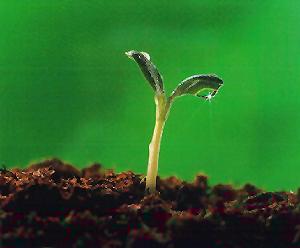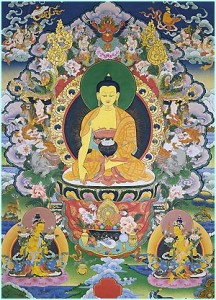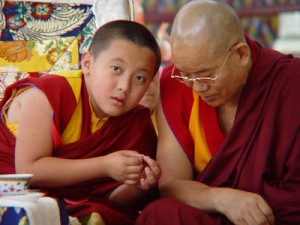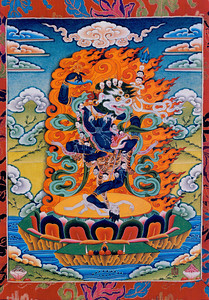An excerpt from a teaching by Jetsunma Ahkon Lhamo from the Vow of Love series
Cause and effect are infallible. They are 100 percent infallible. The reason I think this bears mentioning is that again and again I have seen practitioners, even those who have practiced Buddhism for a long time, do things they know will cause suffering, or even cause them to fall off the path and end their quest to follow the Buddha’s teaching. I see them create non-virtue constantly.
People trick themselves. Once they know that non-virtue is the cause for suffering, because there is a karma that ripens from the seed of non-virtue, they tend to create non-virtue in a sneaky way, thinking no one will ever know. They’ll say things like, “I’m a Buddhist. I really can’t kill. I’ve taken this vow. I’m wearing these robes.” And, whap! They’ll swat a mosquito. Or even more subtle than that, they’ll make judgments thinking, “No one knows what’s going on in my mind. No one will know.” But they are constantly judging, and they think it will never bear fruit.
According to Buddhist teaching, and according to what I have seen, karma never fails to ripen. What you have done is create a non-virtue, and that non-virtue grows like a seed in your mindstream. It is an absolutely unchanging law that non-virtue will ripen in some way. The reason why you think you are getting away with judging others, for example, is because that seed may not ripen now. It may ripen ten years from now when you won’t remember what you thought about that person. Or it may ripen next week, and you know how much you remember from last week! Or it may ripen in the next life, in which case there is no possible way that you could remember. But invariably, it will ripen.
In this way, the Buddha’s teaching is born out. Even though we know all sentient beings are suffering, that the cessation of suffering is enlightenment, and that all sentient beings want to be happy, we still don’t know how to create the causes of happiness. Through non-virtuous actions we continue to create suffering instead. Even though we have these concepts memorized, strangely, we still manage to create non-virtue continuously. Therein lies the schism, the schizophrenia, the craziness that we have: while we continue to yearn for happiness, and yearn for a life and a mind state that can only be the result of a complete absence of non-virtue, we continue to create non-virtue. It is psychotic. It is really schizophrenic. You are not in touch with reality when you act this way. You are not creating your life in a way that you truly want to live.
The problem lies in our lack of understanding of cause and effect. You need to convince yourself completely, as though it were written in cement in your mind, that cause and effect are infallible. Find a way to know this as deeply and instinctively as you know that if you stop breathing, your body will expire. Know this on such a profound level that it manifests like an instinct. Strive to internalize these ideas to such an extent that they never leave you, and that your mindstream is pregnant with them. Strive, so that you cannot consider creating non-virtue even one moment.
Now, brothers and sisters, this is a tall order. But for that reason, it is necessary to study the Buddhist truth, and you don’t have to be a Buddhist to do it. You just have to look around. Open your eyes and look around. All sentient beings are suffering. But unfortunately, until your mind is softened and gentled through realizing that all sentient beings are suffering – that you yourself are suffering – you will never be able to convince yourself of the infallibility of cause and effect, because you will never consider that it is useful to consider the infallibility of cause and effect.
© Jetsunma Ahkön Lhamo











